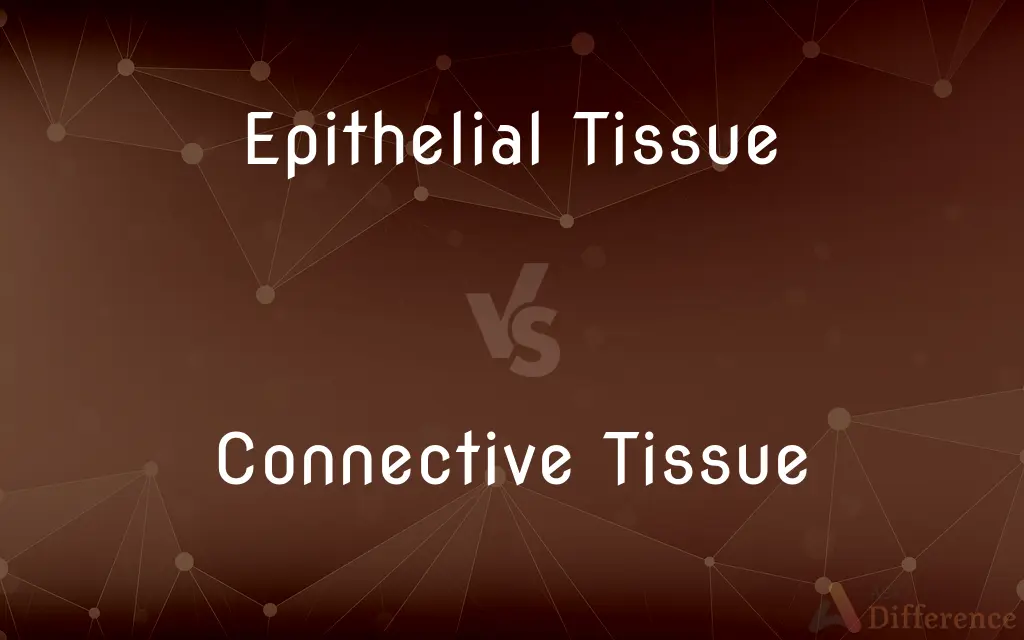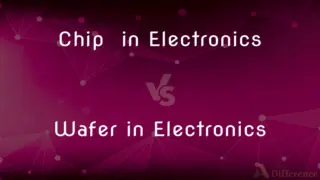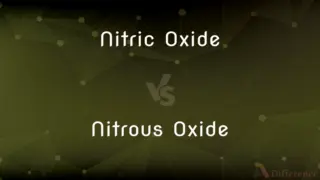Epithelial Tissue vs. Connective Tissue — What's the Difference?
Edited by Tayyaba Rehman — By Fiza Rafique — Published on December 1, 2023
Epithelial tissue covers body surfaces, lines cavities, and forms glands; Connective tissue supports, connects, and separates different body parts.

Difference Between Epithelial Tissue and Connective Tissue
Table of Contents
ADVERTISEMENT
Key Differences
Epithelial tissue is a continuous sheet of cells that covers and lines various parts of the body, including the skin, mouth, and internal organs. It functions as a protective barrier, selective filter, and sensory surface. Connective tissue, on the other hand, is diverse and is found throughout the body. It offers support, connects body parts, and provides protection.
Epithelial tissue has a high rate of cell division which aids in rapid healing. It lacks blood vessels but has nerve endings. Connective tissue, however, varies in vascularity. Some like cartilage lack blood vessels, while others like areolar tissue have an abundant supply.
Epithelial tissue derives from all three primary germ layers: ectoderm, mesoderm, and endoderm. Its cells are tightly packed, often with specialized junctions. In contrast, Connective tissue predominantly derives from the mesoderm and has a matrix composed of protein fibers and a ground substance.
In Epithelial tissue, cells have a polar arrangement with an apical and a basal surface. This polarity is essential for their functions. Connective tissue lacks this polarity as its primary goal is to fill spaces and provide structural and functional support.
Epithelial tissue is classified based on cell shape and layers, such as squamous, cuboidal, and columnar. Connective tissue has a broader classification, including bone, cartilage, blood, and various fibrous tissues.
ADVERTISEMENT
Comparison Chart
Basic Function
Covers and lines body surfaces
Supports, connects, and separates body parts
Cellularity
Tightly packed cells
Sparse cells in a matrix
Blood Supply
Avascular (no blood vessels)
Varies (e.g., cartilage is avascular)
Origin
All three germ layers (ectoderm, mesoderm, endoderm)
Primarily mesoderm
Examples
Skin, lining of mouth and throat
Bone, cartilage, blood, tendons
Compare with Definitions
Epithelial Tissue
A layer of cells that covers body surfaces.
The skin is a type of Epithelial tissue.
Connective Tissue
Varies in blood supply and type of matrix.
Tendons, a type of Connective tissue, connect muscle to bone.
Epithelial Tissue
Cells arranged in continuous sheets, either single or multiple layers.
The cornea's outer layer is Epithelial tissue.
Connective Tissue
Contains cells, fibers, and ground substance.
Blood, a Connective tissue, transports nutrients.
Epithelial Tissue
Tissues lining internal cavities and passageways.
The inner lining of the stomach is Epithelial tissue.
Connective Tissue
Protects and insulates internal organs.
Adipose tissue, a form of Connective tissue, insulates the body.
Epithelial Tissue
Responsible for sensation, secretion, and absorption.
The intestines use Epithelial tissue to absorb nutrients.
Connective Tissue
Plays a role in immunity and storage.
Bone marrow, a Connective tissue, produces blood cells.
Epithelial Tissue
Cells forming protective barriers and secreting substances.
Glands are formed from Epithelial tissue.
Connective Tissue
Tissue that provides support and binds body parts together.
Bones are a form of Connective tissue.
Common Curiosities
Are Epithelial tissues vascular?
No, they're avascular, meaning they lack blood vessels.
Are there nerve endings in Epithelial tissue?
Yes, even though it's avascular, it contains nerve endings.
Where is Connective tissue found?
Throughout the body, providing support, connection, and separation.
What's a unique feature of Epithelial tissue cells?
They have a polar arrangement with an apical and basal surface.
Do all Connective tissues have a good blood supply?
No, it varies. For instance, cartilage is avascular.
What are the main types of Epithelial tissue based on shape?
Squamous, cuboidal, and columnar.
Can you give an example of a liquid Connective tissue?
Yes, blood is an example.
What's the primary function of Epithelial tissue?
It covers and lines body surfaces, cavities, and forms glands.
Is the skin considered an Epithelial tissue?
Yes, the skin's outer layer is Epithelial tissue.
How is Connective tissue primarily classified?
By its content and function, such as bone, cartilage, and blood.
What connects muscles to bones?
Tendons, a type of Connective tissue, perform this function.
What is the matrix in Connective tissue?
It's composed of protein fibers and a ground substance.
What type of Connective tissue stores energy?
Adipose tissue stores energy in the form of fat.
From which germ layers does Epithelial tissue originate?
All three: ectoderm, mesoderm, and endoderm.
Do Epithelial tissues have a role in sensation?
Yes, they function in sensation, secretion, and absorption.
Share Your Discovery

Previous Comparison
Chip in Electronics vs. Wafer in Electronics
Next Comparison
Nitric Oxide vs. Nitrous OxideAuthor Spotlight
Written by
Fiza RafiqueFiza Rafique is a skilled content writer at AskDifference.com, where she meticulously refines and enhances written pieces. Drawing from her vast editorial expertise, Fiza ensures clarity, accuracy, and precision in every article. Passionate about language, she continually seeks to elevate the quality of content for readers worldwide.
Edited by
Tayyaba RehmanTayyaba Rehman is a distinguished writer, currently serving as a primary contributor to askdifference.com. As a researcher in semantics and etymology, Tayyaba's passion for the complexity of languages and their distinctions has found a perfect home on the platform. Tayyaba delves into the intricacies of language, distinguishing between commonly confused words and phrases, thereby providing clarity for readers worldwide.













































